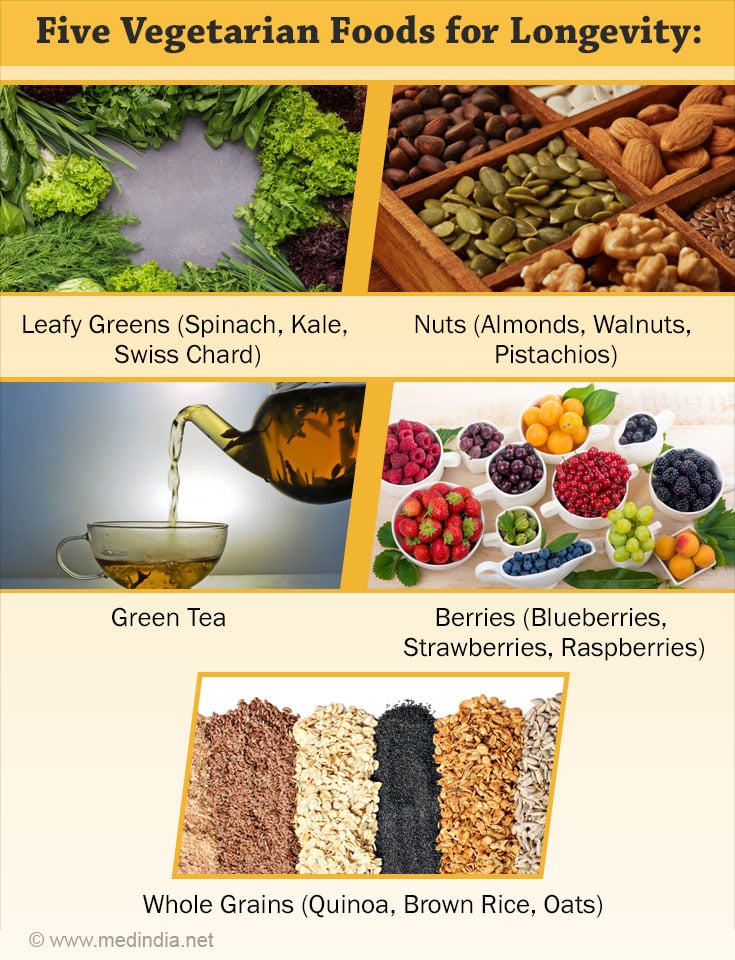- Vegetarian diet: How to get the best nutrition - (https://www.mayoclinic.org/healthy-lifestyle/nutrition-and-healthy-eating/in-depth/vegetarian-diet/art-20046446)
- The 10 Best Foods for Longevity - (https://www.denverhealthmedicalplan.org/blog/10-best-foods-longevity)
- Green tea consumption and mortality in Japanese men and women: a pooled analysis of eight population-based cohort studies in Japan - (https://pubmed.ncbi.nlm.nih.gov/31392470/)
About
Adopting a plant-based diet is a proven way to enhance health and increase longevity. Certain foods in a vegetarian diet are particularly beneficial, as they are loaded with antioxidants, healthy fats, and other nutrients that protect against chronic diseases(1✔ ✔Trusted Source
Vegetarian diet: How to get the best nutrition
Go to source).
Nutrient-Rich Vegetarian Foods to Live Longer
Here are five vegetarian foods that stand out for their ability to promote long life(2✔ ✔Trusted Source
The 10 Best Foods for Longevity
Go to source).
1. Leafy Greens (Spinach, Kale, Swiss Chard)
Why Leafy Greens?
Leafy greens are some of the most nutrient-dense foods available. These low-calorie vegetables are packed with vitamins, minerals, and antioxidants that play a vital role in maintaining long-term health.
Nutritional Profile:
Leafy greens are rich in vitamins A, C, K, and B6, as well as minerals likeHealth Benefits
Cardiovascular Health: Leafy greens help lower blood pressure and prevent arterial damage, reducing the risk of heart disease.
Anti-Inflammatory Effects: They are full of antioxidants like lutein and beta-carotene, which help combat inflammation and oxidative stress, two major contributors to aging.
Bone Health: The calcium and vitamin K found in spinach and kale contribute to stronger bones and lower the risk of osteoporosis.
How to Include Leafy Greens:
Incorporate leafy greens into salads, smoothies, and soups. Sauté spinach or kale with a little garlic and olive oil for a nutrient-rich side dish.
2. Nuts (Almonds, Walnuts, Pistachios)
Why Nuts?
Nuts are incredibly nutritious, packed with heart-healthy fats, protein, and a wide range of vitamins and minerals that promote longevity.
Nutritional Profile:
Nuts are an excellent source of unsaturated fats, fiber, protein, vitamin E, magnesium, and selenium. Walnuts, in particular, are rich in omega-3 fatty acids.Health Benefits
Heart Health: Eating nuts regularly helps lower LDL (bad) cholesterol and raise HDL (good) cholesterol, improving heart function and reducing the risk of cardiovascular disease.
Brain Health: Omega-3 fatty acids in walnuts support brain function, reducing the risk.
Weight Management: Despite being calorie-dense, nuts promote satiety, helping with weight control and reducing obesity-related diseases.
How to Include Nuts:
Eat a handful of almonds or walnuts as a snack, or sprinkle them over salads, yogurt, or oatmeal. Use nut butters in smoothies or as a spread on toast.

3. Green Tea
Why Green Tea?
Green tea is renowned for its antioxidant properties, making it one of the healthiest beverages on the planet. It contains powerful compounds that protect against aging and promote longevity(3✔ ✔Trusted Source
Green tea consumption and mortality in Japanese men and women: a pooled analysis of eight population-based cohort studies in Japan
Go to source).
Nutritional Profile:
Green tea is rich in polyphenols, particularly catechins, which are powerful antioxidants. It also contains small amounts of vitamins and minerals, including potassium and magnesium.Health Benefits
Anti-Aging Effects: The antioxidants in green tea fight free radicals, which are responsible for cellular damage and aging. Drinking green tea has been associated with a reduced risk of chronic diseases like heart disease, stroke, and cancer.
Brain Health: Green tea contains compounds that improve brain function and may reduce the risk of neurodegenerative diseases like Alzheimer’s and Parkinson’s.
Did You Know?
Green tea's powerful antioxidants can protect your brain, lowering the risk of Alzheimer's by 40%! #longevity #greentea #medindia
Metabolism Boost: The catechins in green tea can enhance fat burning and improve metabolic rate, contributing to weight control and overall health.
How to Include Green Tea:
Enjoy a cup of green tea daily, either hot or iced. For an extra boost, try matcha, a powdered form of green tea that contains even higher levels of antioxidants.
4. Berries (Blueberries, Strawberries, Raspberries)
Why Berries?
Berries are packed with vitamins, fiber, and antioxidants, making them one of the best fruits for longevity. Their high nutrient density helps protect against chronic diseases and promotes healthy aging.
Nutritional Profile:
Berries are rich in vitamins C and K, fiber, and antioxidants like anthocyanins, which give them their bright colors.Health Benefits
Heart Health: The antioxidants in berries help lower blood pressure and cholesterol levels, reducing the risk of heart disease.
Brain Function: Regular consumption of berries has been linked to improved cognitive function and a slower rate of age-related brain decline.
Cancer Prevention: The high levels of antioxidants and phytochemicals in berries help neutralize free radicals, lowering the risk of cancer.
How to Include Berries:
Add fresh or frozen berries to smoothies, yogurt, or oatmeal, or enjoy them as a snack. You can also use them in desserts or salads for added sweetness and nutrition.
5. Whole Grains (Quinoa, Brown Rice, Oats)
Why Whole Grains?
Whole grains are an important part of a balanced diet. They are rich in fiber and essential nutrients that support digestion, heart health, and weight management.
Nutritional Profile:
Whole grains contain complex carbohydrates, fiber, protein, and a variety of essential vitamins and minerals, including B vitamins, magnesium, and iron.Health Benefits
Digestive Health: The fiber in whole grains supports healthy digestion by promoting regular bowel movements and preventing constipation.
Heart Health: Whole grains help reduce cholesterol levels, lower blood pressure, and improve heart health, decreasing the risk of cardiovascular disease.
Weight Management: Whole grains provide sustained energy, helping to regulate appetite and maintain a healthy weight, which is crucial for longevity.
How to Include Whole Grains:
Cook quinoa or brown rice as a base for meals, or enjoy oats for breakfast. You can also incorporate whole-grain pasta or bread into your diet for a healthier alternative to refined grains.
Incorporating these five vegetarian foods such as leafy greens, nuts, green tea, berries, and whole grains into your daily diet can help promote longevity and support overall health. These nutrient-dense foods are packed with antioxidants, healthy fats, and fiber, all of which help protect against chronic diseases and support a longer, healthier life.









